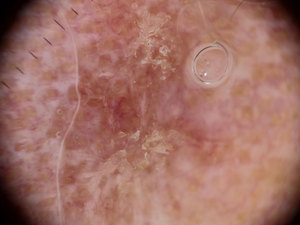Actinic Keratosis & SCC
Actinic Keratosis
Actinic Keratosis is a precursor for Squamous Cell Cancer (SCC). If and when a lesion will progress to SCC is difficult to determine. Recently there has been some discussions around Actinic Keratosis as being not just pre-cancerous, but that we should see it as part of the spectrum of SCC.
Management of Actinic Keratosis
For single lesions of Actinic Keratosis, the preferred treatment is cryotherapy using liquid nitrogen. For multiple lesions where a field effect is needed, topical creams or gels are used most times. The most well-known topical treatment is 5-Fluorouracil (5-FU; Efudex). Other topical medication includes Imiquimod (Aldara), Methyl aminolevulinate (Metvix) and Ingenol mebutate (Picato).
For further information, see Management of Skin Cancer and
Patient observations whilst using 5-FU
Cutaneous Squamous Cell Cancer (cSCC)
This is a keratinocyte cancer and compromises roughly 15% of skin cancers. One of the main clinical features is heavy keratinization (i.e. thickening of the skin) and they usually show up as raised, rough pink lesions.
Cumulative sun exposure plays a vital part in the development of cutaneous SCC and in countries with a high level of solar radiation the incidence of SCC is increased. Other factors that increase the incidence of SCC are immunosuppression, infections (HPV infection) and burn wounds.
In the head and neck region and rarely in other areas these tumors can metastasize.
Pre-malignant lesions for SCC are called Actinic Keratosis (see above). SCC itself can be classified as in situ (Intraepidermal Cancer (IEC); Bowen’s disease) or invasive (well differentiated; poorly differentiated).
Management of Squamous Cell Cancer (SCC)
The most common initial treatment for invasive SCC are Wide Local Excision. For in situ SCC topical or locally destructive treatment modalities can also be used but the risk for recurrence is increased. For advanced local disease and metastatic disease chemotherapy and immunotherapy are indicated. For further information, see Management of Skin Cancer.
Following the diagnosis of SCC, an annual Skin Screening Exam is indicated to screen for SCC but also for other skin cancers, including melanoma. In most cases Mole Mapping would be indicated as well.




